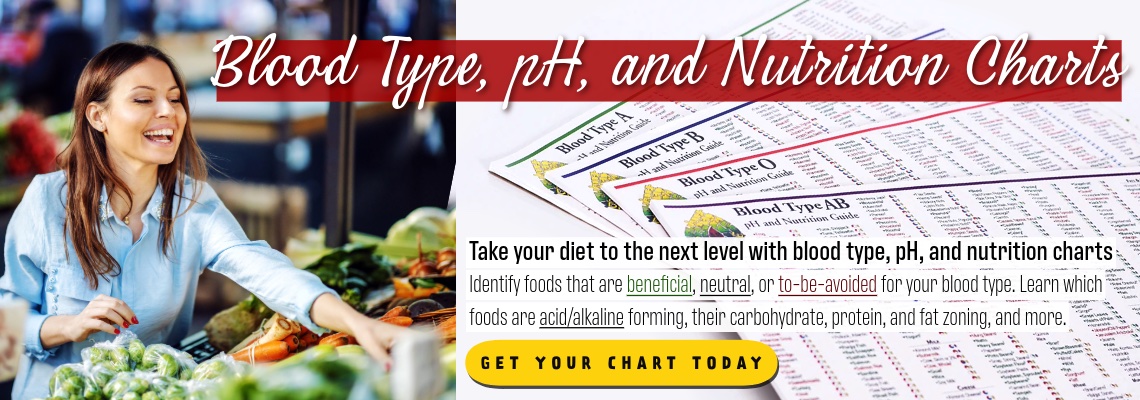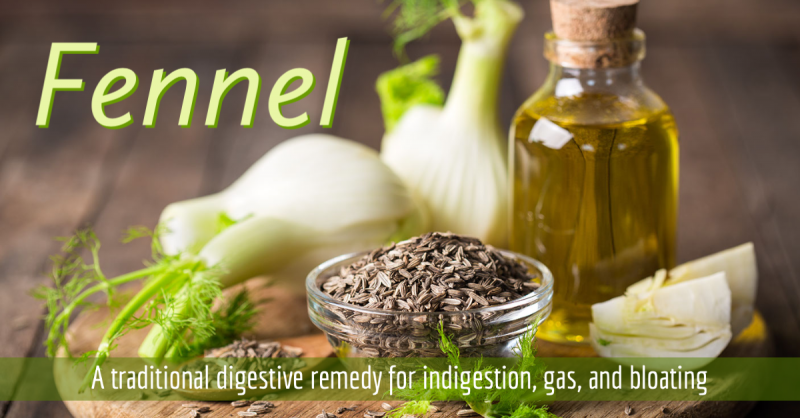
Last week, many Americans celebrated Thanksgiving. It’s one of those times where people tend to eat too much and suffer from indigestion and bloating. So, I thought it would be appropriate to discuss one of the best remedies for easing digestive distress—fennel.
Fennel seeds have been used as a digestive aid and carminative since the days of the Roman Empire. They have been used in traditional Chinese medicine for the same purpose, helping to treat abdominal distention and pain, vomiting, and diarrhea. We’ll talk about using fennel as a digestive remedy but we’ll also explore some of the other, perhaps lesser-known uses for it.
Fennel and Digestion
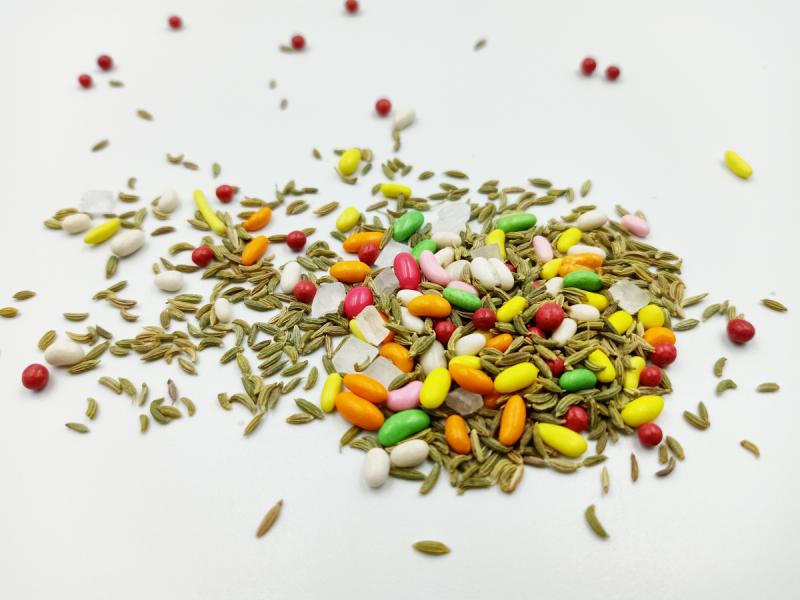 If you’ve ever been to an Indian restaurant, you may have seen a small dish of candied fennel seeds, mixed with plain fennel seeds, near the cash register. You take some after dinner because it aids digestion. I have purchased some and eaten them after meals at home and they are really helpful if you have a tendency to indigestion.
If you’ve ever been to an Indian restaurant, you may have seen a small dish of candied fennel seeds, mixed with plain fennel seeds, near the cash register. You take some after dinner because it aids digestion. I have purchased some and eaten them after meals at home and they are really helpful if you have a tendency to indigestion.
Fennel’s ability to aid digestion is why it is a part of one of the most famous herbal duos, catnip and fennel, a popular remedy that has settled the tummy of many a colicky baby. Fennel seed is not only a valuable carminative that helps this formula ease gas and colic, it is also antispasmodic, which eases cramping and pain. It’s also completely safe for children and has a mild, sweet flavor which makes it easier to actually get children to take it.
Catnip and fennel can be taken as a tea or tincture, but I’ve found it easier to give to children when I’ve made it as a sealed simmer glycerite. I also made a formula I called Super Catnip and Fennel by adding meadowsweet to it as follows:
- 2 parts catnip
- 2 parts fennel
- 1 part meadowsweet
If you want to make an even stronger formula to relieve bloating and indigestion in adults, here’s another version.
- 2 parts
- 2 parts fennel
- 1 part lobelia
- 1 part peppermint
Again, I recommend making both of these formulas using the sealed simmer glycerite method, but for adults you can also make them as a tincture. You can also tincture fennel with other carminative seeds from the parsley family—anise, caraway, coriander, and dill—to make an adult formula for indigestion, gas, bloating, and adult colic.
One of my favorite commercial formulas for intestinal bloating and gas is the Gas & Bloating Formula from Gaia Herbs. Fennel is the primary herb in the formula, which contains fennel seed, fennel seed extract, and fennel essential oil. In addition to other carminatives, the formula also contains charcoal, which is very effective at easing severe gas and bloating.
Beyond Digestion
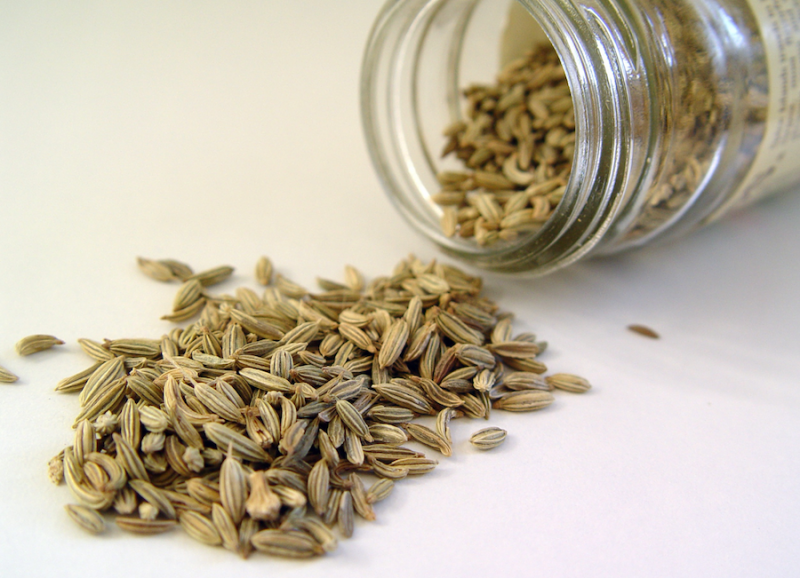 Besides its beneficial effects on digestion, fennel is a mild expectorant, especially for children. It is helpful for shortness of breath, bronchitis, and wheezing. It can also be used as a gargle for sore throats.
Besides its beneficial effects on digestion, fennel is a mild expectorant, especially for children. It is helpful for shortness of breath, bronchitis, and wheezing. It can also be used as a gargle for sore throats.
Fennel is also helpful for the urinary system. It is a gentle diuretic and has been combined with uva ursi to treat cystits. It has even been used to aid the passing of kidney stones.
Nursing mothers can benefit from fennel because it stimulates the production of breast milk. It sweetens the breast milk, meaning it makes the milk more palatable to the child and reduces digestive upset in nursing babies.
Fennel also helps regulate the appetite. It can stimulate poor appetite and calm down excessive appetite to aid in weight loss. It’s also helpful for hiccups
Finally, because it has a mildly sweet flavor, fennel makes a good flavoring agent in herbal formulas. It is especially helpful in formulas containing bitter herbs for the digestive, hepatic, and intestinal systems, as it helps reduce the bitterness of the formula.
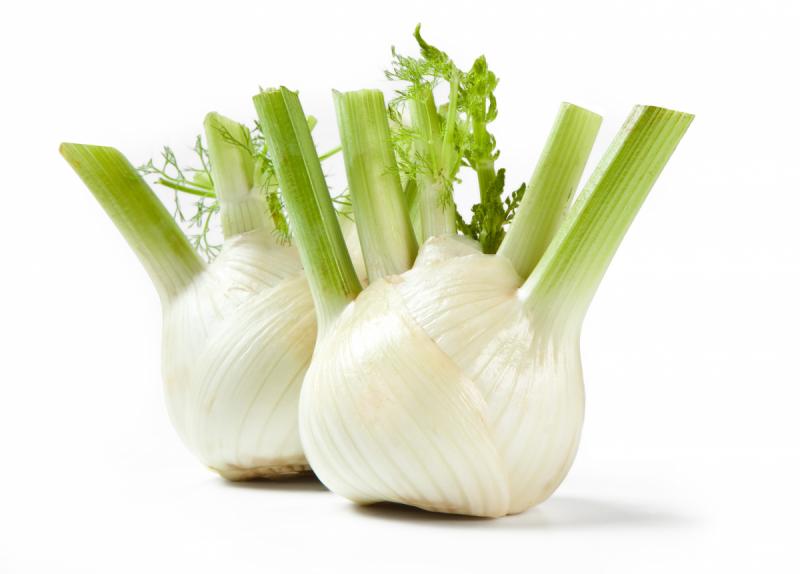
Fennel as a Vegetable
In cool weather, fennel can form a bulb at the base of the plant which can be harvested as a vegetable. You’ll sometimes see it in grocery stores. It’s crisp and has a milder fennel flavor than the seeds and is a healthy medicinal food. It aids digestion, helping to ease constipation and IBS. It also reduces appetite, eases colic and gas, and aids breast milk production.
Fennel Essential Oil
The essential oil of fennel has the same antispasmodic and carminative properties as the seeds, only stronger. Fennel oil can be diluted by adding a drop or two to a spoon of honey or coconut oil and taking it internally to ease gas, bloating, and stomach cramps. It also helps to clear fluid congestion and aid lymphatic flow. It can also help with wheezing and difficulty breathing, as in asthma or COPD.
In traditional Chinese medicine, the stomach and digestion are associated with the earth element. A person who is overly pensive, that is wrapped up in their own thoughts and disconnected from the needs of their body, will tend to suffer from digestive upset, including gas, belching, bloating, and the craving for sweets. The essential oil helps digestion not only from a physical perspective but also from an emotional one as well. Here’s why.
Fennel as an Emotional Remedy
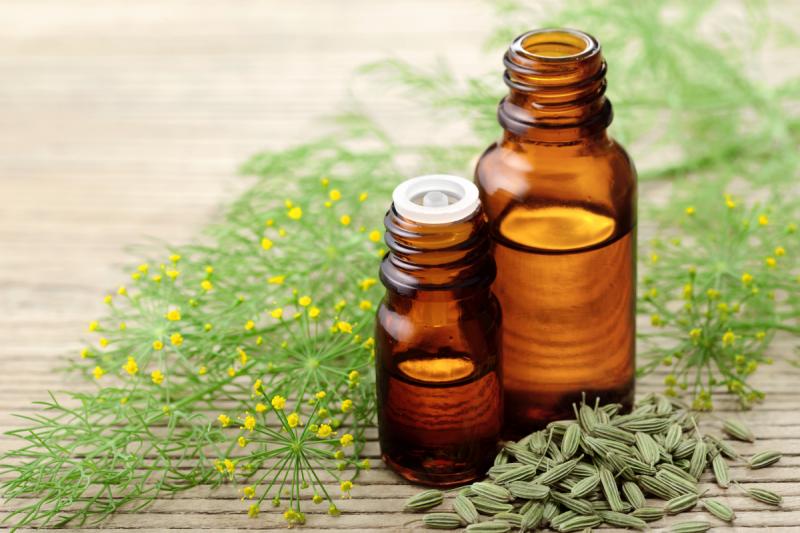 Like many members of the parsley family, fennel is a large open, airy plant, but it is also a deeply rooted perennial. This is why it does well in climates with a dry summer. It’s one of the few medicinal plants I was able to grow successfully here in St. George, which has very hot summers. I’ve also spotted it growing wild all over California as I’ve traveled in that state. This helps us understand its emotional signatures.
Like many members of the parsley family, fennel is a large open, airy plant, but it is also a deeply rooted perennial. This is why it does well in climates with a dry summer. It’s one of the few medicinal plants I was able to grow successfully here in St. George, which has very hot summers. I’ve also spotted it growing wild all over California as I’ve traveled in that state. This helps us understand its emotional signatures.
The person who needs fennel is too airy, that is, they live too much in their head. They overthink and overanalyze things. They may also have trouble expressing their emotions or taking action on their ideas, even they may be very busy. This excess energy in the mind, and lack of energy in the gut, results in frequent digestive upset.
The person requiring fennel needs to be more grounded, more connected to their body and the material world. The cramping in their stomach is a reflection of the excessive churning in their mind. The sweet, slightly earthy smell of fennel helps pull the energy of these people downward, into their guts. This helps them move from thinking into action, which discharges the emotional tension and eases their digestion.
The bottom line is that fennel helps you digest things, not just your food, but also your thoughts. So, if you spend too much time in your head, and suffer from indigestion, fennel may be the perfect remedy for you.
Steven's Articles
-

-
Reishi (Ganoderma) Mushroom
A TCM remedy for calming the shen (spirit), balancing…
-

-
Eucommia Bark
A superior tonic that promotes kidney, structural,…
January
-

-
Goldenthread, Phellodendron, and Yellow Root
Three herbal remedies containing the infection-fighting…
-

-
Teasel
A traditional herb for healing bones and joints…
-

-
Barberry and Healthy Personal Boundaries
A thorny shrub for fighting infections and supporting…
December
-

-
The Evidence for Berberine
A yellow alkaloid found in traditional infection-fighting…
-

-
The Sensible Use of Caffeinated Herbs
Kola nuts, guarana, and yerba mate and other herbs…
-

-
The Health Benefits and Problems with Coffee
This popular caffeinated beverage can be beneficial…
October
-

-
Understanding Caffeine & Cellular Adaptation
Preserving the power of caffeine's buzz and the…
September
-

-
Horseradish
A pungent spice for aiding protein metabolism…
-

-
Banaba or Crepe Myrtle
A beautiful tree from Southeast Asia whose leaves…
August
-

-
Monkeyflowers
Flower essences to help see ourselves more clearly…
-

-
Mariposa Lilies
Strengthening the bond between mother and child…
-

-
The Noble Bay Leaf
A common kitchen herb for aiding digestion and…
-

-
Epimedium: Horny Goat Weed
A circulatory stimulant and kidney yang tonic…

